|
|
| |
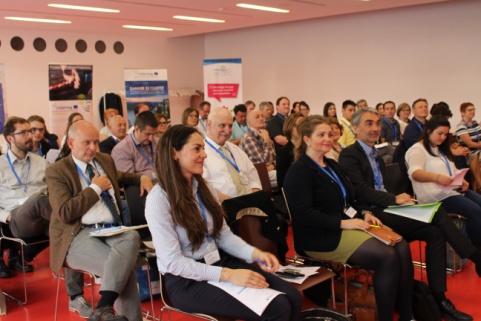 |
|
This is it now: The tenth and last newsletter of our project Made in Danube. As authors we see the newsletter with mixed feelings. On the one hand, we are sad that our cooperation has come to an end after two and a half years.
As a consortium, we have continued to grow together over these period, mastered challenges together and celebrated successes. On the other hand, the end of the project offers the opportunity to view our numerous results once again with pride and clarity, thus paving the way for future cooperation.
We would like to thank you, dear readers, for the loyalty you have demonstrated over the years. As part of the Made in Danube community, you have shown continuous interest and contributed your very own part to the success of the project!
On June 3rd the Made in Danube Final Event took place in Stuttgart. In front of numerous guests and friends from industry, science and public authorities we successfully presented the final results of the project in presentations and panels.
Before we say goodbye to you, we will take you one last time on the Made in Danube journey in this issue of the newsletter and provide you with project results and news from our beautiful Danube region! Even beyond the project’s end we plan to maintain our website and social media channels online. We want to stay in touch with you in order to continue to pursue solutions for successful technology and knowledge transfer in the field of bioeconomy.
With that in mind Made in Danube says Good-Bye and is looking forward to fruitful future cooperations.
Yours sincerely,
The Made in Danube consortium
More... http://dtp.interreg-danube.eu/made-in-danube
|
|
| |
 |
Cooperation and partnerships along danube; future of danube Transfer centre (DTC) Network
|
| |
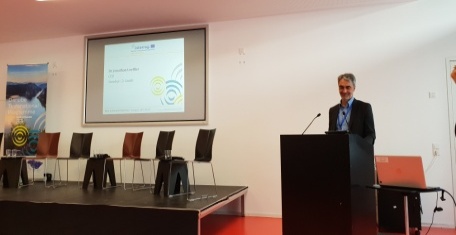 |
|
Statement by Dr. Jonathan Loeffler (CEO, Steinbeis 2i GmbH)
I am particularly delighted with the success of the Danube Transfer Centres (DTC) network in recent years, as they provide proof of a successful learning-by-doing concept. Started as a pilot project in 2012, the members are now central contacts for technology transfer in their regions. With the involvement of multiple regional actors, in the sense of the Triple Helix Approach, the Centers play an important role in reducing structural disparities between individual regions and in promoting balanced regional development and competitiveness.
In addition, membership in the DTC network opens up extensive networking and cooperation opportunities for all partners, which leads to a better alignment of instruments and services and towards removing obstacles to getting good ideas to market.
The success of the initiative was made possible by the long-term commitment and enthusiasm of the partners involved, but also centrally by projects of the European Territorial Cooperation.
Thanks to their place-based focus, INTERREG funding projects in particular enabled us to sustainably promote knowledge transfer in the regions and further develop the vision of a transnational innovation and knowledge network.
|
|
| |
 |
made in danube: main results; new concepts for innovation partnerships and sustainable knowledge & technology transfer in the bio-economy sector
|
| |
|
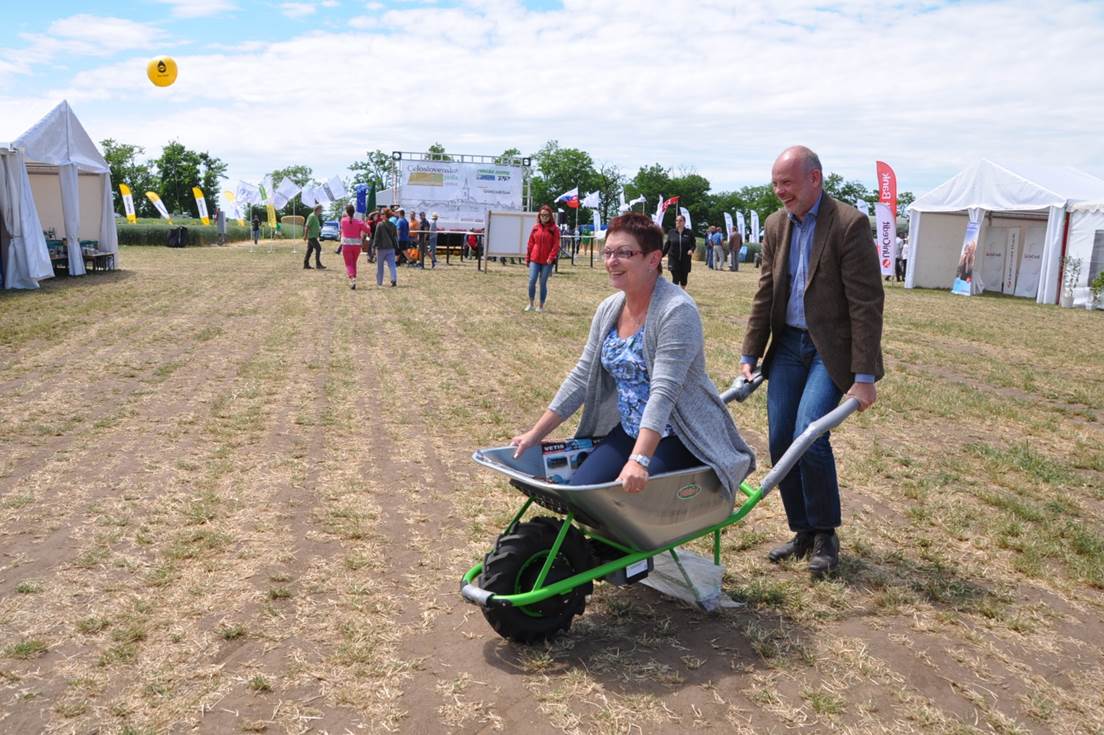 |
|
Among the main project objectives was the intensification of cooperation among project partners with key actors in the Programme Area. Within Made in Danube we achieved:
- 15 Innovation Partnership Agreements;
- the development of 3 online innovation tools (more infos here;
- 30 Techonology Offers and 28 Technology Requests performerd and inserted into the Platform with free access;
- Supporting 40 companies collaborating with RTOs;
- Development of a Common Strategy to bring R&D results on market;
- Establishment of Bio-economy network in the Danube Region
|
|
| |
 |
Made in Danube testimonials:
Daniela Chiran, senior project manager, steinbeis-europa-zentrum
|
| |
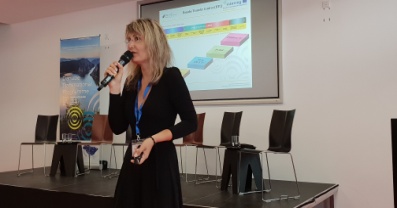 |
|
By facilitating the collaboration between the Business sector, Research and Technology Organizations and Public Authorities in the Bio-economy sector, Made in Danube aimed to establish a long-term knowledge, innovation and technology transfer in the Danube Region. Our ultimate goal was to enable the use of the local expertise on the transnational level and to unlock the exploitation of the existing potentials by supporting the concrete transnational collaborations.
More... http://dtp.interreg-danube.eu/made-in-danube
|
|
| |
 |
miljana ćosić, project manager, steinbeis-europa-zemtrum
|
| |
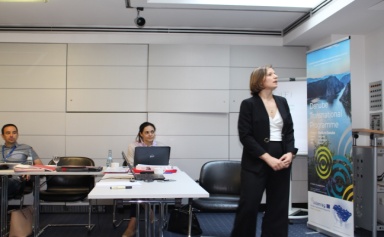 |
|
Made in Danube Project was a great opportunity to connect the Quadruple Helix actors active in the Bio-economy sector to jointly develop new solutions for the common challenges in the Danube Region, especially when talking about the wider exploitation of the innovation capacities of SMEs. Building the trust is one of the key elements for the successful Technology Transfer. Made in Danube proved that this kind of collaborations can be established and be sustainable on the long term.
|
|
| |
 |
Vedrana Džoić, head of department, vukovar-Srijem county development agency
|
| |
|
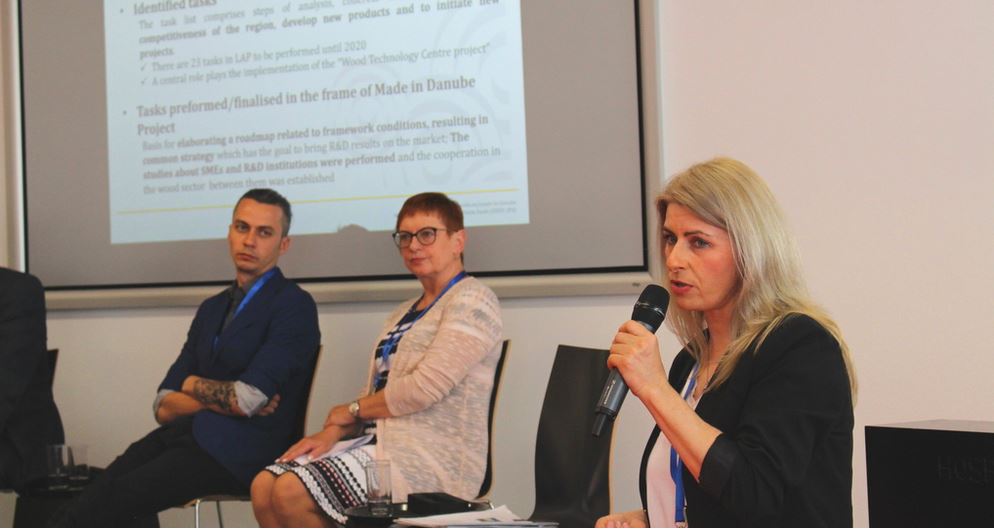
VSC DA through the participation in the project made connections between RTO and entrepreneurs, which will continue in a positive and fruitful cooperation aimed at completion on objectives of the project. The internationalisation of our companies is the biggest benefit of the project for the Vukovar-Srijem County. The established cooperations on the Danube region level is welcomed by regional authority, the prefect of Vukovar-Srijem County and his deputies, and recognized as drivers of innovation and development in the wood sector. Also important role of the project is education of civil society, expert and wider public about innovations and possible solutions of issues in wood sector on regional level. The workshops contributed to strengthening links with civil society for a better acceptance of scientific results and commercial success of innovative ideas and products.
|
|
| |
 |
assoc. prof. mihai dragomir, phd, manager dtc tu cluj-napoca - knowledge hub
|
| |
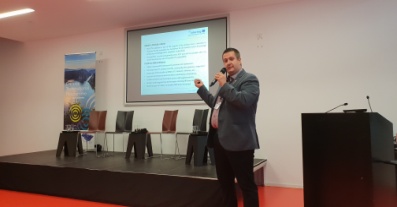 |
|
Made in Danube has been an excellent cooperation project for the Technical University of Cluj-Napoca and for the Danube Transfer Centre Cluj-Napoca. Were confident that the results produced by the project consortium will be very useful for supporting and fostering innovation and technology transfer in the Danube Region in the future. Also, we are glad we had the opportunity to develop the Danube Transnational Innovation Cooperation e-tool as a modern and complete platform that supports knowledge exchange in the field of bio-economy in this part of Europe and beyond. I would like to use this occasion to thank the project leaders, all the project partners for their collaboration with our team.
|
|
| |
 |
assoc. prof. danka moravčíková, transfer centre university of agriculture nitra, slovakia
|
| |
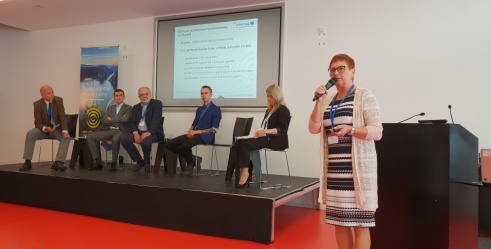 |
|
On behalf of our University, I want to thank the Lead Partner for putting together an excellent consortium of projects partners, and organizing very interesting events and activities. I am enjoying interactive working with other pilot initiatives within the DTC network, as well as working with developed methods and tools. Of most importance were the tips and tools we learned on technology transfer and innovation audits. It will be very helpful or our institution for the future cooperation with companies.
|
|
| |
 |
Bernd Finger, head of unit, eu-affairs, ministry of science, research and arts Baden-württemberg
|
| |
|
Cooperation in the Danube Region is all about creating linkages - between different levels of public policy, between different countries or regions, and between different sectors of society. "Made in Danube" was a great opportunity for me to learn more about activities in the field of technology transfer and with regard to bio-economy and I am sure that this will be a valuable contribution to cooperation in the area of universities / higher education institutions and in the Priority Area on "Knowledge Society".
|
|
| |
 |
Daniel ács, president, union of slovak clusters
|
| |
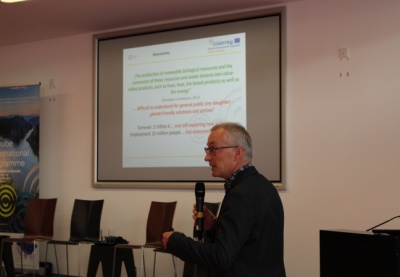 |
|
International project "Made in Danube" has "Made" several strong impacts "in Danube" region. First, it brought and shared new knowledge to assist innovative SMEs with practical needs in bioeconomy through cooperation with researchers. Second, the project interlinked recognized innovation and technology transfer organizations across Danube region to internationalise the most innovative SMEs. Third, the project raised importance of bio-economy for all stakeholders including policy makers and general public. Thank you for great experience and actually launching a new business model in bio-economy.
|
|
| |
 |
Roxana apreutesei, counselor, ministry of research & innovation, innovation & Infrastructure, directorate rdi, romania
|
| |
|
The final event in Stuttgart taught me that continuing the good work means convincing institutions & various sources of funding it is worth doing so. It is not only the EU internal market hat should generally convince all of us to team up for good projects together regardless of the EU country or region were coming from, but it is also the challenge of keeping up with USA and China, with the international market of disruptive innovations.
EU cannot afford not to have everybody on board, with proper funding for all the regions lagging behind, as the potential for disruptive innovation and innovative SMEs maybe some times higher in the eastern regions of Europe. And this is an international battle that the stronger economies of the EU do not wish to loose, so all the EU regions need each other."
|
|
| |
 |
made in danube final event, 3 june 2019, stuttgart, germany
|
| |

At the beginning of 2017, the Made in Danube project was launched with the aspiring aim of providing long-term support for knowledge, innovation and technology transfer in the Danube Region.
Supported by the INTERREG Danube Transnational Programmed, 15 multidisciplinary project partners have successfully worked over the past two and a half years on the development and implementation of innovation tools and the establishment of innovation partnerships in the field of Bio-economy in the Danube macro-region.
As the project draws to a close end of June 2019, during the final event we were pleased to share our results and success stories from our three Local Initiatives with you. Thanks to interactive keynotes and thematic panels, participants were further informed about future perspectives for knowledge, innovation and technology transfer in the Danube region.
In the following articles, we are happy to share the main messages and information of this eventful day with you.
|
| |
 |
priority area 8 "competitiveness" cross-fertilisation innovation & Technology transfer workshop with thematic focus on ket & the wg i&tt task force on agriculture + farming | Forestry, 3rd june 2019, stuttgart, Germany
|
| |
|
Objectives and Topics:
- To establish a pool of knowledge in the thematic field of KET (AMT) to support the Task Force “Innovative Rural and Urban Ecosystems” (Agriculture + Farming and Forestry) within the EUSDR PA8 Working Group "Innovation and Technology Transfer" (WG I&TT).
- KET: Key Enabling Technologies provide the basis for innovation and comprise micro and nanoelectronics, nanotechnology, industrial biotechnology, advanced materials, photonics, and advanced manufacturing technologies.
- AMT: Advanced Manufacturing Technologies can upgrade production activities of manufacturing SMEs towards resource-and energy efficiency, materials consumption, operating precision, waste, pollution management, productivity etc.
- To bring in the relevant stakeholders and their contribution to the achievement of EUSDR PA8 WG I&TT objectives and to support the Interreg DTP Capitalisation Strategy through adopted projects.
- To identify opportunities for cooperation among the Danube area in the thematic field innovation and Technology Transfer and Pole 1 Innovative Ecosystems in SMEs as well as KET/AMT for the future Task Force.
|
| |
|
| |
 |
optmization of value-adding. industry4.0
|
| |
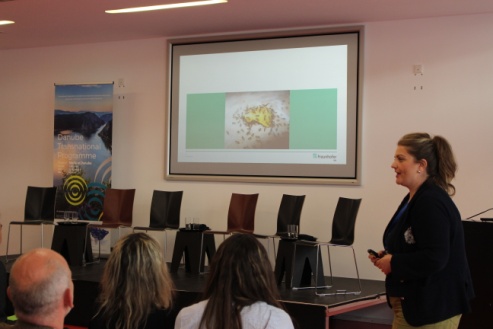 |
|
- Development Stages of the Digital Transformation From digital image to autonomous system
- Digitalization - Mechatronic Systems (Digital image of analog processes (e.g. NC technology, 2-D CAD, MRP/ERP)
- Virtualization - Cyber-physical Systems (Digital modeling of processes (e.g. CAD/CAM, FEM, digital factory)
- Connectivity - Autonomous Systems (Integration of all value creation processes via broadband telecommunication (e.g. industrial IoT, cloud computing, CPS, 5G)
- Autonomization (Combination of classic technologies and artificial intelligence create autonomous, self-organizing systems (e.g. autonomous transport systems, autonomous robots)
|
|
| |
 |
Eu Strategy for the danube region-priority area 8 "competitiveness" of smes
|
| |
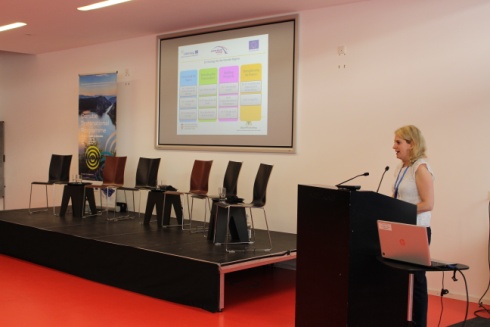 |
|
During her presentation Dr. Judit Schrick-Szenczi (Ministry of Economic Affairs, Labour and Housing Baden-Württemberg; Co-Cordinator of EUSDR PA 8) explained during Made in Danube Final Event the organizational structure of the Priority Area and the Working Groups assigned to it, namely: Digital Danube, Cluster Cooperation, Artificial Intelligence, Female Entrepreneurship, Innovation and Technology Transfer.
She further explained that under the objective of "better embedding the EUSDR’s prosperity pillar into suitable funding instruments within the new MFF", joint Proposals of PA7, PA8 and PA9 were addressed to the EC and national Coordinators of the EUSDR. The following measures have to be taken:
- On Partner State level: dedicating meaningful chapters for MRS in the programming documents
- On PA level: concrete formulation of funding ideas and measures in order to make visible for the funding programmes: what exactly is requested?
- Danube Strategy Point and the Trio-Presidency of the EUSDR: coordination of the second stage.
|
|
| |
 |
Products and production processes inspired by nature
|
| |
|
Dr.-Ing Simina Fulga-Beising from the Fraunhofer Institute for Manufacturing Engineering and Automation (IPA) informed the participants about biological transformation aspects and its conceptual understanding which include:
- Increasing utilization of materials, structures and processes of living nature in technologies with the goal of sustainable added value
- Mutual communication between biological and technical systems - interaction – Biointelligent manufacturing
- Biological systems and principles are part of the technology – integration – Biointegrated manufacturing
- Biology serves as model for technical applications – inspiration - Bio-inspired manufacturing
Using an example of optimization algorithms based in ant colonies, biological transformation is currently deployed at IPA to e.g. solving complex optimization problems, planning efficient routes and as a necessity for decentralized and adaptive organizations.
|
|
| |
 |
Bio-economy as a pan-european priority
|
| |
|
The keynote was held by Daniel Ács, president of the Union of Slovak Clusters and Made in Danube Project Partner. The presentation was designed to inform participants about new policies, technologies and digistisation aspects in the field of bioeconomy as well as the key outcomes of Europe's Bioeconomy Strategy.
|
|
| |
 |
panel 1: made in danube as a driver for transnational innovation partnerships | success story of three local initiatives local action initiatives
|
| |
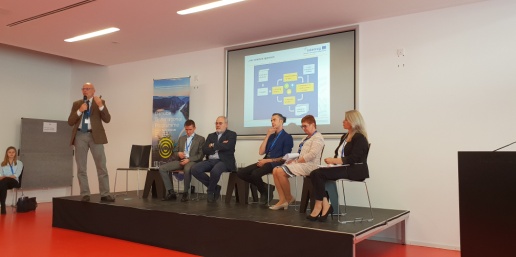 |
|
During the first thematic Panel, the project consortium invited representatives from its three local initiatives (smart precision farming, biofuels & forestry) including their SME cooperation partners on stage. Project and cooperation partners had the opportunity to present their cooperation within the framework of the project and to point out possible obstacles and improvements in the field of innovation and technology transfer. The following points were taken up and underlined:
- Continuous improvement of task list of local initiative.
- maintain / improve Competitiveness
- Sustainability of the activities.
- Connection to stakeholders and decision makers the region
- Feedback and support.
|
|
| |
 |
panel 2: made in danube in the context of the eu strategy for the danube region
|
| |
|
Within Panel 2 representatives of Public Authorities (Mrs. Roxana Apreutesei, Ministry of Research and Innovation | Innovation and Infrastructure Directorate CDI, Romania; Dr. Judit Schrick-Szenczi | Coordinator of the EUSDR PA8 “Competitiveness” | Ministry of Economic Affairs, Labour and Housing Baden-Württemberg, Germany and Mr. Bernd Finger, Steering Group of the EUSDR Priority Area 7 “Knowledge Society ” | State Ministry of Baden-Württemberg for Sciences, Research and the Arts, Germany) discussed the Role of Public Authorities within the EU and EUSDR legal and financing framework for innovation. The focus here was on adapting politically strategic programs to current trends such as industry 4.0. and digitization.
|
|
| |
 |
future scenarios for innovative & competitive bio-economy partnerships; lessons learned from made in danube
|
| |
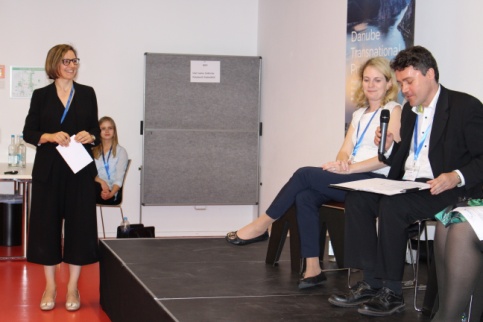 |
|
Lastly, Miljana Ćosić (Made in Danube Project Manager) rounded off the programme and presented the results of the project in terms of institutional, financial and political sustainability. As a conclusion, she noted that Made in Danube contributed to improved framework conditions, but we need to continue to follow new trends:
- Strengthening the human capital, but taking care about social needs:
- Building transnational partnerships and fostering the knowledge & innovation transfer for the local, regional and EU added value;
- Building the trust and boosting the motivation to achieve the EU Innovation Union goals, namely:
- Making Europe into a world-class science performer
- Remove the obstacles for innovation
- Revolutionize the way public / private sectors work together, through Innovation Partnerships between the European institutions, national and regional authorities and business
|
|
| |
 |
made in danube - communication activities
|
| |
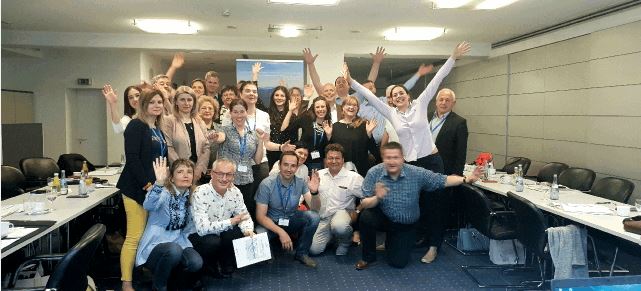 |
|
During the last Steering Committee Meeting in Stuttgart on 4th June Ms Isabel Trömel (Communication Manager Made in Danube project) presented to the partners the target groups reached by the project so far:
- Regional Public Authorities - 35% more than planned at the beginning of the project
- Higher Education and Research Institutions – 46 % more than planned at the beginning of the project
- SMEs – already 90% achieved
- Business Support Organisation, Clusters & NGOs – 40% more than planned at the beginning of the project
- General Public – 100% target fully achieved
|
|
| |
 |
made in danube - framework conditions; objectives; outputs:
|
| |
- Reviewed and improved framework conditions for innovation in DR by Elaborating a Roadmap to achieve a Common Strategy on how to transform R&D into marketable products/services and implement it in the 3 existing regional initiatives (Novi Sad, Vukovar, and Nitra) – Roadmap to Improve framework conditions for Innovation
- Supported the R&I policy dialogue in the DR with EUSDR PA Steering Groups and ensure exchange information on activities and cross cutting issues related to Bioeconomy during Policy Dialogue Workshops
- Transferred the Common Strategy in 3 Local Action Plans for the regional Initiatives that will be implemented, based on tools developed Common Strategy to bring R&D results on the market Common Guidelines to support transformation of ideas into marketable products and services for the 3 existing regional initiatives: Smart and innovate precision farming, Wood sector and Bio-fuels)
|
|
| |
 |
made in danube - policy recommendations
|
| |
- The Danube Region needs to have concrete & tangible results regarding research and innovation in Bio-economy sector.
- Made in Danube defined priorities for the improvement of innovation and framework conditions for Agriculture & Forestry and Biofueld in the Danube Region
- Made in Danube capitalized on existing information: study, policy dialog, working with PA from EUSDR, previous projects, analyze the needs of the existing regional initiatives.
|
|
| |
 |
Made in danube - tools and services
|
| |
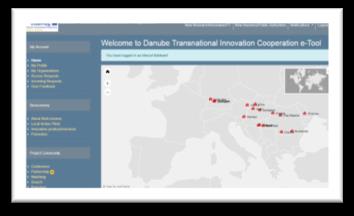 |
|
The consortium members of the Interreg DTP “Made in Danube” project would like to get to know you better by asking you some questions:
- Do you want to boost the competitiveness of your products or services?
- Are you interested in technology transfer and innovation support?
- Is the bio-economy entity you represent located in the Danube Region?
- Do you want to become a project partner or leader in this region?
- Are you seeking out organizations with visions compatible to yours?
If you answered only one question with "yes", it's worth taking a look at our e-tool innovation avialble here.
|
|
| |
 |
made in danube - implementation of pilot projetcs
|
| |
Made in Danube supported the exchange of good practices in technology transfer and innovation partnership by establishing a transnational network. Outputs:
- Supporting companies cooperating with RTO.
- 40 companies involved in CAs and IPAs.
- 2 Brokerage events organized.
- Pilot implementation of the Action Plan.
- 3 regional existing initiatives.
- 15 innovative partnerships.
- Establish Bio-Economy transnational network included into PA8: Competitiveness of Enterprises.
|
| |
 |
the 8th annual forum of the eu strategy for the danube region, 27-28 june 2019, bucharest, romania
|
| |
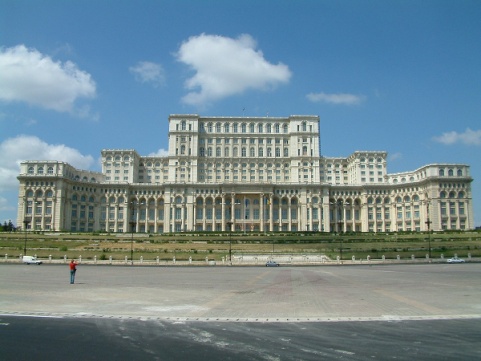 |
|
The Annual Forum was jointly organised by Romania (current Presidency of the EUSDR) and the European Commission, under the motto: ''Building cohesion for a shared prosperity in the Danube Region''.
The Annual Forum this year focused on competitiveness, connectivity, regional mobility and cohesion interface for creating synergies that can result in a better embedment of EUSDR into future EU programmes and policies.
It further aimed at promoting:
- Strategic projects in transport, digitalisation, green technologies and tourism,
- Transnational clusters' development,
- Post-2020 EU policy design,
- New Cohesion Policy
- Danube Transnational Programme,
- EU mainstream operational programmes
- links between the EU Macro-Regional Strategies, and the Danube Region.
JRC is engaged in supporting concerned EU macro regional strategies processes and activities. Through the Enlargement & Integration Initiative the JRC will support a pre-paid travel and accommodation of selected researchers / experts from Albania, Bosnia and Herzegovina, Montenegro, North Macedonia, Serbia, Kosovo, Turkey, Armenia, Georgia, Moldova and Ukraine to participate to the 8th Annual Forum.
|
|
| |
 |
steinbeis 2i gmbh and eusdr priority area 8 "competitivenenss", working group "innovation and technology transfer" official ceremony of the danube transfer centers, 27th june 2019, bucharest, romania
|
| |
Steinbeis 2i GmbH and EUSDR Priority Area 8 “Competitiveness”, Working Group “Innovation and Technology transfer” invited selected guets to the Official Ceremony for the Danube Transfer Centers.
Within the framework of our Danube Transfer Centre (DTC) project, a project to support innovation and technology transfer in Danube Region using the Steinbeis model, the Official Ceremony constituted a further extend of the DTC network in the Danube Region, introducing new members and reinforcing existing alliances. DTCs are a flagship project of the EUSDR Priority Area 8 “Competitiveness” (PA8), Working Group “Innovation and Technology Transfer” and generate a transnational added value. During the Official Ceremony of the DTC on 27 June 2019 (16:30 – 17:30), we celebrated the following occasion together with partners and friends:
- Signing the Memorandum of Understanding for the Danube Transfer Center Zagreb, Croatia
- Signing the Letter of Commitment for the Danube Transfer Center Craiova, Romania
- Signing the Letter of Intent for the Danube Transfer Center Carinthia, Austria the University of Carinthia.
More... http://suerd.gov.ro/en/event/official-ceremony-the-danube-transfer-centers/
|
| |
 |
boku staff exchange visit at university of wageningen
|
| |
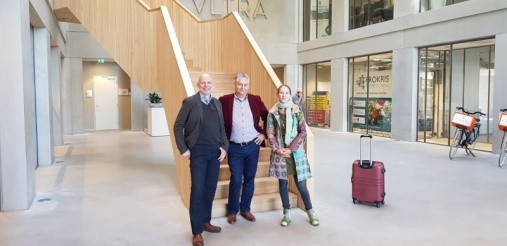 |
|
During the BOKU Staff exchange visit at University of Wageningen, Netherlands, Bernhard Koch / Michaela Amstötter introduced Mirjam Troost from Wageningen to the idea and concept of Made in Danube. They underlined the excellent Network function of the Made in Danube consortium, especially of the big overlap in the thematic areas of the University of Wageningen - Made in Danube. The excellent facilities for young entrepreneurs as well as for experienced companies in Wageningen have been particularly impressing.
More... https://www.wur.nl/de/Wageningen-University.htm
|
|
| |
 |
danube s3 cluster - transnational cluster cooperation active on agro-food, based on smart specialization approach in the danube region
|
| |
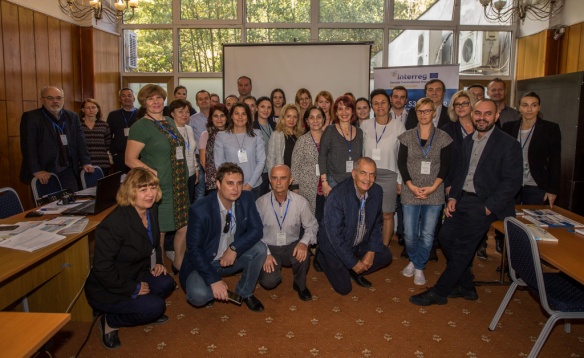 |
|
To leverage the innovation-driven entrepreneurial ecosystem in the Danube area by developing smart and coordinated cluster policies in the context of RIS3, to enhance innovation management knowledge and skills and foster transnational cluster cooperation in Agro-Food sector. Specific objectives:
- Develop cluster policies and implementing instruments - Implementation of 5 regional pilot initiatives in 4 cross cutting themes;
- Enhance innovation management knowledge - Development of 2 innovation assessment tools and delivering 3 training sessions;
- Foster cooperation for clusters active on Agro-Food - Development of Danube S3 Cluster Strategy and Programe and providing 3 training sessions and 2 brokerage events.
More... http://dtp.interreg-danube.eu/approved-projects/danube-s3-cluster
|
|
| |
 |
bioeconomy forum; clusters & smes ; research, innovation and entrepreneurship
|
| |
|
| |
 |
calls/bio-economy capital
|
| |
|
| |
 |
events in the field of bioeconomy, technology transfer, innovation and business finding partners
|
| |
- 11 September, Brokerage Event during HUSUM Wind Match 2019, Schleswig-Holstein, Germany
- 16 September, B2B meetings at EMO Hanover 2019, Brokerage Event, Hanover. Germany
- 23 - 29 September, European Biotech Week, Across Europe
- 30 September - 02 October, EFIB: European Forum for Industrial Biotechnology and the Bioeconomy, Brussels, Belgium
- 9 October, Horizon 2020 for the Circular Economy and Transforming Industry, Brokerage Event, Warsaw, Poland
- 28 October Life Science Partnering 2019, Brokerage Event, Innsbruck, Austria
- 4-5 November, EPO-Conference-Boosting-your-strategy-with-IP, Dublin, Ireland
|
|
| |
 |
technology offers & technology request in bio-economy field
|
| |
|
The aim of Made in Danube is to boost three already existing regional innovation pilot initiatives in the field of bio-economy. Operating in agro-biotechnologies, wood-processing and bio-energy, they all have significant potential for eco-innovation but still fail to fully exploit it because of the “missing links” to required resources.
Using a platform and simple TO/TR tools, the companies and the R&D entities can practically master the varying demands associated with product innovation, participate at brokerage events and match-making the TO and TR.
More... http://www.ipacv.ro/made-in-danube/tools/to/offers ; http://www.ipacv.ro/made-in-danube/tools/tr/requests
|
|
| |
 |
social media - made in danube
|
| |
|
|
|
|
| |
|
If you have received this newsletter, you have been included on one or more of the Danube Transnational Programme/projects postal mailing lists. We are committed to respect and protect the privacy of personal data collected. We regard your personal data as confidential information and will never communicate it to third parties. Your personal data are used mainly for the express purpose of receiving the newsletter. Your mailing details may also be used by the DTP and its projects for information and dissemination purposes strictly related to the programme and its projects. If you prefer not to receive more of this newsletter and your data not to be used for dissemination purposes, you can unsubscribe by sending a reply email.
|
|
|
|
|
|
